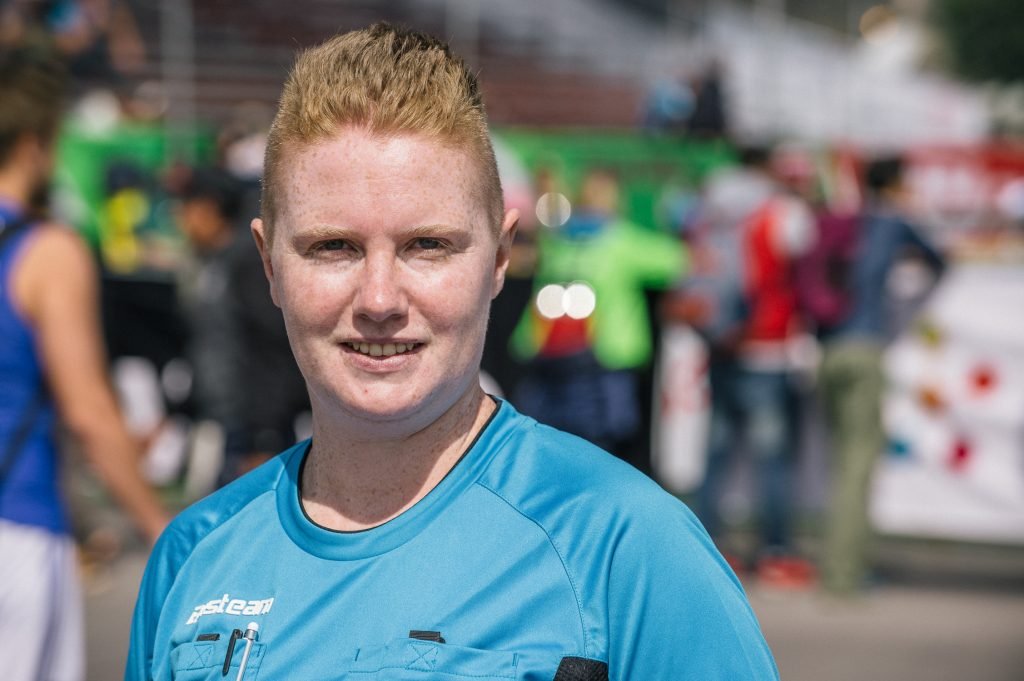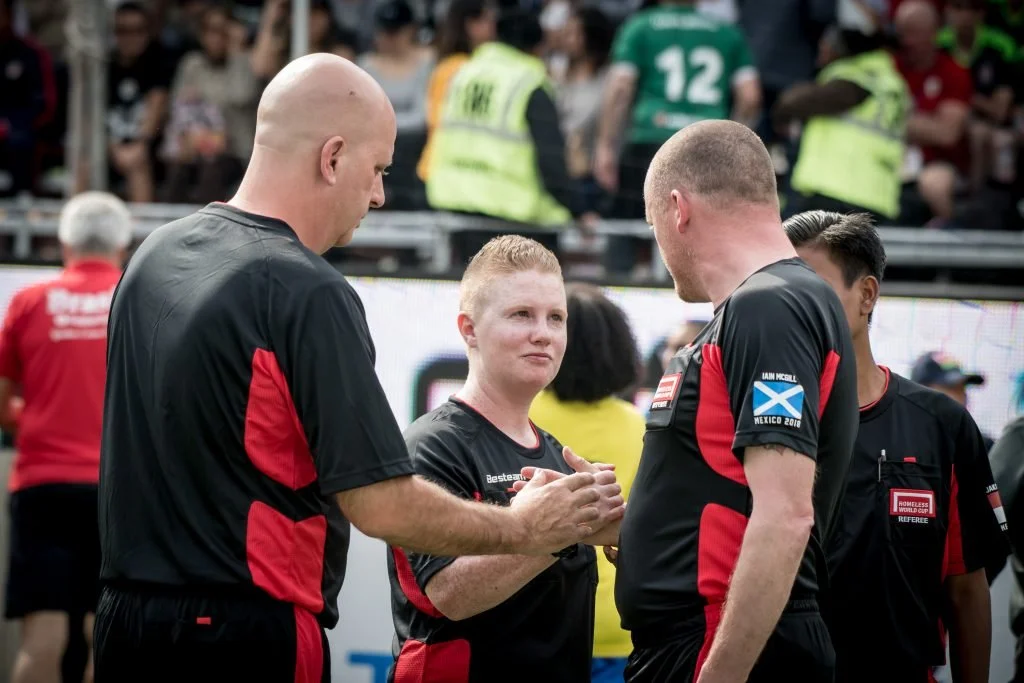A special homecoming for former Homeless World Cup player turned referee
|Description of Image. Image: Daniel Lipinski
Four degrees, pouring rain and a thick smog greeted Welsh referee Natalie Handley halfway through last year’s tournament in Mexico City (yes, Mexico, as in tropical Central America) as a freak weather day saw temperatures plummet twenty degrees overnight to more like, well, “Like being back home,” she laughed. “I wasn’t loving the cold yesterday.”
Could an equally freak heatwave be on the cards for this year’s 17th playing of the tournament in Natalie’s home city of Cardiff? Whatever the weather, there’s no question she’s looking forward to writing another chapter in her inspirational Homeless World Cup journey, this time on home turf.
Rewind to 2014, however, and a very different Welsh lass could never have imagined she’d be wielding the whistle in Mexico City’s iconic Zocalo Square just four years later.
“I was going through a really tough time. My head was all over the place. I’d run away from my problems and I was drinking, self-harming,” she relates.
“A girl I knew played for Street Football Wales. I’d never played before – well, a bit of a kickabout when I was younger – but I’d never played street football. So she asked me along to play a bit of football and it turned out to be team selection day!”
Street Football Wales is a charity helping people who are socially excluded, building on their confidence, self-esteem, health, fitness and providing social integration through football. The round ball game, however, had never really figured in Natalie’s youth.
“When I was growing up football wasn’t my thing,” she adds. “There wasn’t a female team in my area – in fact, I was playing some rugby before. I started off as flanker then went on the wing, but I found rugby was making me a worse person.
“It’s an aggressive game and I was getting too physical, just wanting to hurt myself or other people. And that’s not the way to be. That’s when my head was really bad. I needed that feeling of hurting myself to feel I was really alive.
“My brother played football for a local team, though – they were in the Welsh Prem – so maybe I take a bit after him. He thinks this is brilliant. He’s not playing any more so to have someone in the family who’s involved and doing as well as I’m doing is nice for him to see.”
Back to 2014, and how did she go from the chilly streets of Cardiff to the Chilean capital?
“Some of the guys involved with Street Football Wales knew my problems and encouraged me to come along and have a game,” she continues. “I was put through my paces, I was taught how to play that format and encouraged to give it a go – then, what to do you know, training started for Chile!”
Santiago was the venue for the twelfth Homeless World Cup and just twelve weeks later Natalie and her new Street Football Wales teammates embarked on the seven-thousand-mile trip to Chile’s capital city, to compete in front of 100,000 spectators.
“Thank goodness I did have a passport and everything else was sorted out by Street Football Wales,” she explains. “I really struggled with the heat – suffered from heat exhaustion – but the experience was absolutely brilliant. It was the first time I’d ever been abroad, too – had the passport but had never used it – and first time flying.
“It was a 15-hour flight, then you’re playing and suddenly under immense pressure. You don’t think about that until you look up from the pitch and see every stand full and think…what have I let myself in for?
“But it was the best experience of my life. It started my recovery. Basically with the help of my family and Street Football Wales, football made me a better person.”
The guidelines for competitors rule out any use of alcohol or drugs, though as Natalie says, “You don’t need to drink, you don’t need to self-harm – you have all these people around to support you.
“At the time, back home, I was going through counselling. I had the support of my parents, and it kind of put my life into focus. I was going through a tough time but a lot of people I met in Chile were going through a rougher time and that put things into perspective.”
On her return from Chile, Natalie continued with counselling and started drinking less.
“I admit I did have a bit of a comedown when I got back from Chile, though – like every tournament – because you’ve been on such a high. There’s been all the cameras, all the media asking you about your story – you’ve felt like a bit of a superstar. Then coming back home you feel a bit a slump for a couple of weeks.
“It’s horrible, that slump when you come back from a tournament and you don’t know what to do with yourself but you need to find that purpose in what you want to do.
“For me, the football season started again, I got more involved, playing in the leagues and took on a role as assistant team manager. That meant looking at potential players for the next year – you’ve got to look forward in life.
“I have a drink now and again, these days,” she adds, “but it’s not that kind of problem for me anymore. I don’t have to drink. My self-harming reduced and now I’ve completely stopped.”
A player in Chile in 2014 – participants can only ever play once in the Homeless World Cup – Natalie took on the role of assistant manager to the Welsh women’s squad for both Amsterdam in 2015 and Glasgow in 2016. More was to come, however when Keri Harris (Street Football Wales Project Leader) invited her to take part in a referee course being run in Wales by Homeless World Cup.
|”I wasn’t sure if refereeing was for me” Image: Anita Milas
“I wasn’t sure if refereeing was for me,” she admits, “but I was doing some reffing back home in the league so I thought I had nothing to lose and would give it a go. So, I went on the course and they said they were going to pick one male and one female to go to Oslo (Homeless World Cup venue in 2017). They picked me and Craig (Denner), so that was my road to refereeing.”
Whistle-blowing duties in Oslo were followed by officiating at a street football tournament in Austria then came the call to travel to Mexico. From player to manager to coach to referee – how has that re-formed her perspective of the game?
“I found it hard at first because I enjoy playing so much, so being the referee made it difficult to enjoy the game in the same way,” she admits. “I knew my manager days were over because it was other peoples’ turns to take on these roles so I kind of thought refereeing was the next thing, to keep involved. At first it was really hard to get into, but I really, really love it now.”
Being the only female whistler in the black-shirted squad hasn’t thrown Natalie any curve balls either.
“I can have just as much of a laugh as the guys. It helps that I’ve got a brother and I can just relax and be myself. I’m not just a referee, though, I’m a former player so I know all the emotions of taking part in the tournament from various angles.
“I enjoy refereeing – especially involving the likes of Greece. They may not be potential finalist teams, but they so love the game. It doesn’t matter how good they are, they’re just enjoying it. And I enjoy it more, seeing how much they enjoy it!”
Adding to Natalie’s pleasure is the knowledge she has the backing of her own home team.
“My family have been absolutely brilliant, a massive support,” she enthuses. “My brother’s watching me back home and my mum – though she doesn’t have a clue about football! The time difference is making it a bit difficult so it’ll be something I do with them when I go back home, looking at the games on catch-up.”
Playing catch-up is something Natalie is adept at, constantly learning and picking up new skills from her fellow referees.
“Yeah, every day’s a school day! I take all the feedback I’m given, after every game. Whether I messed up, did something wrong, had a great game – all feedback is great for me because every day I learn something new.
“And standing there in the middle of the pitch, as the game’s about to start, the pride is immense. It’s a mixture of the passion for the game as well as appreciation for being in the position I’m in.”
All well and good for taking the field in Mexico City, then, but what about Cardiff 2019?!
“It’s Wales, my country,” she beams. “I’m from about 45 minutes by train from Cardiff. When I was asked in Oslo, in 2017, what would I like for this tournament, I said I would love it to be held back in my country.
“Cardiff’s going to take really well to the tournament. I think they’ll do great. They had the Champions league there a couple of years ago and really staged it well. They’ve got Cardiff University involved, the Council – everyone is really wanting the event to be great success, which I know it will be.”
As success stories go, however, Natalie has very much been the author of her own best-seller – and knows where the twist came in the tale.
“Football has made me a better person. I’m more confident in myself because being in the middle of the game you need to have confidence. And I believe in myself. I didn’t believe in anything I did but now I do.
“Anything is possible as long as you believe in yourself.”
The 17th edition of the Homeless World Cup will take place in Cardiff’s iconic Bute Park from July 27 to August 3, involving more than 500 players representing over 50 countries.
Words: Isobel Irvine
Images: Daniel Lipinski / Anita Milas


